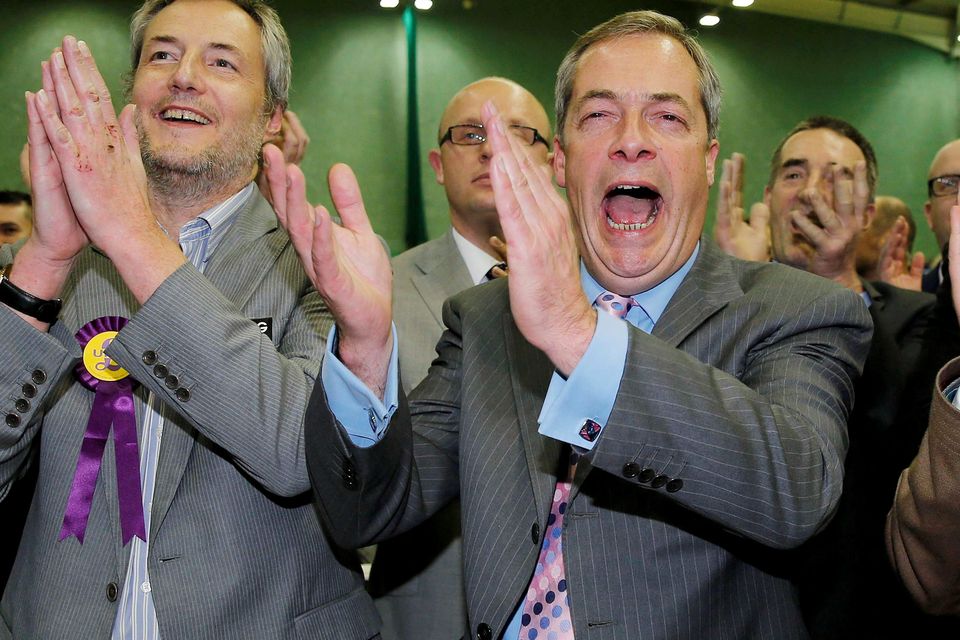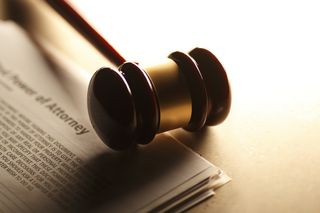The crumbling of trust in Irish society will end badly
As distrust in mainstream politics is too great to reverse quickly, the chances of ungovernability are rising fast
Nigel Farage, leader of the United Kingdom Independence Party (UKIP), cheers as it is announced that UKIP candidate Mark Reckless, the former Conservative Party member of Parliament for Rochester and Strood, won the by-election at Medway Park in Gillingham, southeast England, November 21, 2014 (REUTERS/Suzanne Plunkett)
Just over one in five people trust government in Ireland according to an opinion poll published last week. More widely, the average level of trust in four national institutions - government, business, the media and non-governmental agencies, such as charities - is under one in three people.
There is no other country among the 27 covered in the world-wide survey in which people have less trust in their nation's politics and civil society institutions. The extreme low levels of trust in Irish society that this poll points to are worrying, and are something worth paying a lot of attention to.
The poll - published last week by public relations firm Edelman and taken across the world late last year - suggests that something is seriously awry in Irish society. And not just among those who feel excluded.
The survey includes a sub-survey of richer, highly educated, older people, who say they spend considerable time informing themselves on issues of national importance. When the trust levels of this "elite" group are compared to their counterparts elsewhere, Ireland comes second from bottom among the 27 countries.
Irish elites are the second most distrustful of business. In only two other countries are government and the media less trusted by this group. And they trust NGOs less than all other countries, bar three.
In April last year, I argued that Ireland could be heading towards ungovernability. The crisis of trust in Irish society highlighted in last week's survey is one of a number of reasons to believe that Italian-style politics - of weak and short-lived governments - is coming down the track.
Before looking at the factors that are driving up the probability of Ireland becoming ungovernable, allow me to reprise briefly three points I made last April.
First, the fragmentation of the vote that is to be seen in so many European countries in recent decades was masked in Ireland up to 2008. The extended boom-and-bubble period, which was without parallel in the democratic world, allowed Fianna Fail to win a larger share of the vote than almost any party in Europe. But once the years of please-everyone budgets ended, the vote fragmentation that is so common elsewhere kicked in with a vengeance. In other words, the huge change in politics since 2008 is not only about recession, which will pass, but about a longer-term structural change in voter preferences.
Second, fragmentation of the vote matters much more in countries with proportional representation electoral systems. In countries with non-PR systems, the political impact of fragmentation is much more limited. In France, for instance, the extremist National Front party now routinely wins a quarter of the vote, but because the electoral system favours mainstream parties, it has only a handful of seats in parliament. Ukip in Britain is likely to suffer a similar fate in the May general election.
Third, Ireland is unusual among countries with PR voting systems in that it does not have a threshold of electoral support for parliamentary representation. Usually in countries using PR, a party or individual has to win a minimum of 3-5pc of the national vote to be represented in parliament. The upshot of that is, among other things, the near non-existence of independent parliamentarians elsewhere in the democratic world. Ireland, even now, is an extreme outlier in this regard, with far more Independents than any other parliament.
Independents are consistently winning close to 30pc support, double their share of the vote at the 2011 election. These figures would translate into a Dail in which forming a majority would be very difficult and keeping any coalition together for any length of time harder still.
The chances of this happening are considerably greater now than last April, when this column first discussed the prospect of ungovernability.
One reason is that the improving economy appears to be having little impact on voter intentions. Regular newspaper opinion polls show that since mid-2012, when the economy turned a corner, support for the Coalition parties has actually declined.
And this is despite consumer spending in January returning to levels last seen in the summer of 2008, and consumer confidence soaring back to 2006 levels on the back of more than two years of strong jobs growth. Even the first real increase in pay, recorded in the final months of last year and which is underpinning the surge in consumer spending, does not appear to be having an effect (for those interested, my column, on page eight of the business section of this newspaper, analyses in detail the very positive labour market data published last week).
The only evidence that the improvement in the economy is having an impact on voters is the "satisfaction with government" figures. It was in the high teens on average in polls during 2013, rising to the low 20s over last year and into 2015. But given the widening breadth and depth of the recovery, this is marginal. The correlation between the performance economy and support for the government is next to non-existent.
That brings us back to the matter of trust. Despite repeated, if often exaggerated, claims by the Coalition about the nature of the recovery (for instance, the point that Ireland is the fastest-growing economy in Europe is based on notoriously unreliable GDP figures), it seems clear that voters either don't trust the Government on the economy and/or are willing to give it little credit for the turnaround.
While there is good reason to distrust government in Ireland given the record of disastrous economic management dating back to the 1950s, attitudes towards government depend on many factors, including respect for citizens' rights and liberties, adherence to the rule of law and the conduct of the political class.
By these measures, Ireland compares decently with peer countries and far better than the dictatorships included in Edelman survey. On the probity of politicians, the global Corruption Perceptions Index compiled by Transparency International would seem to bear that out. Irish people, when asked specific questions about their experiences of corruption, place Ireland close to the least sleazy countries globally.
While Irish media, NGOs and businesses have all been guilty of wrongdoing - and it is easy to find examples where each has undermined trust - I simply do not believe that they are all to be distrusted more than their counterparts in almost every other country.
It seems bizarre that state-controlled media in China is more trusted by the Chinese than the Irish media is among people here. It is equally curious that oligarch-dominated commerce in Indonesia is more trusted by the people of that country than Irish business is by Irish people. Even the Irish NGO sector is unusual in the amount of distrust it generates, despite the higher prevalence in many countries of NGOs being used as fronts for personal enrichment.
Has healthy scepticism in Ireland turned to unhealthy cynicism? Or do we suffer some sort of inferiority complex causing us to believe that we are the worst at everything? It is not at all clear what explains the deep and wide levels of distrust in Irish society, but it needs greater attention, because societies without trust tend to suffer all manner of ills.
Building trust is such a slow process - and much slower, even, than rebuilding an economy after the sort of crash that we have experienced. It is hard to see trust in government rising sharply in the near future. That means it is increasingly likely that the next election - and very possibly, all elections for the foreseeable future - will produce highly fragmented parliaments in which coalition formation and cohesion comes to resemble Italy. Ungovernability beckons now more than ever.
Join the Irish Independent WhatsApp channel
Stay up to date with all the latest news















